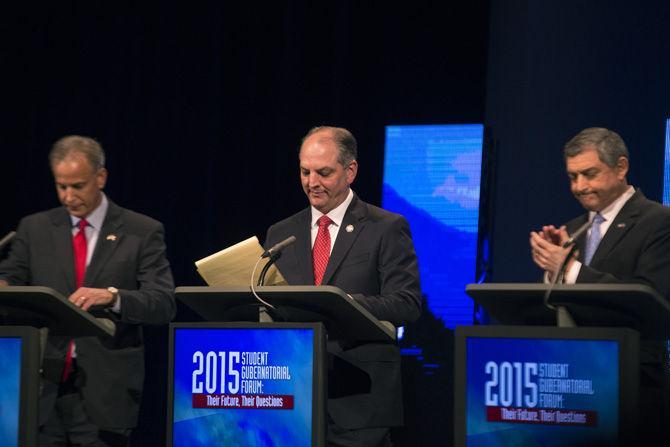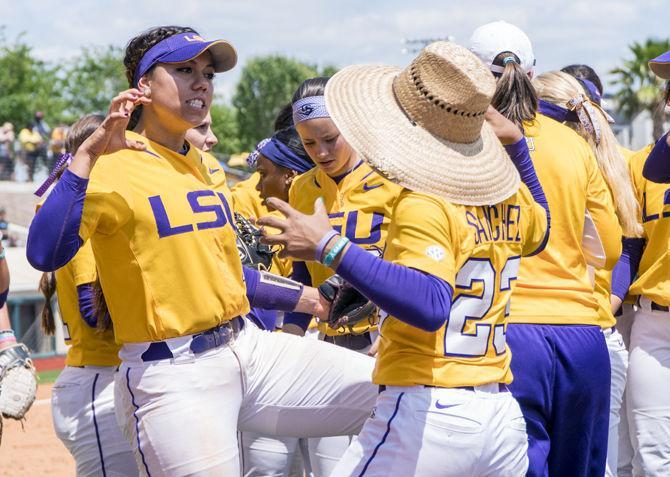This fall, four men fight to fill the void Gov. Bobby Jindal’s poor, nearly nonexistent leadership created in Louisiana.
A U.S. senator, a lieutenant governor, a state representative and a public service commissioner all frantically distance themselves from their potential predecessor and trumpet a coming of change for Louisiana — a stable budget, a stronger economy and a focus on higher education.
As LSU President F. King Alexander said in Wednesday’s broadcast email, the battle to fund higher education is in a stalemate agreed upon by legislators trying to usher the state through Jindal’s last few months in office.
Come January, the budget crisis returns at a projected $713 million shortfall, expected to worsen as oil prices continue to drop. The state’s new governor, no matter the victor of election day’s spoils, will hold a special session to cash in on his newfound political capital and find long-term solutions to the budget deficit.
This vicious cycle of budgetary peace, mayhem and perceived solutions will tear the state’s national competitiveness down. While Alexander pointed to enrollment numbers exceeding last year’s and out-of-state freshmen enrollment’s 11-year high, his statistics won’t last if this upcoming spring mimics last year’s.
We blamed Jindal for the state’s budgetary woes, but in January, he will be gone and the funding crisis will still be here. The next gubernatorial election can ensure there is no need to shout “No funds, no future” on the engraved steps of the State Capitol.
The candidates have been vague on their plans to fund higher education for the long run, with John Bel Edwards and David Vitter offering the most detailed approach out of the four, despite Vitter’s absence from the higher education forum in Hammond on Sept. 2.
Edwards proposes to create a funding system that relies on 50 percent tuition and fees and 50 percent state funding. To find the money to increase state support of higher education to 50 percent, the Democrat looks to cut the state’s generous tax exemption program and rededicate the money to higher education.
He also said he plans to accept the federal Medicaid expansion package and use federal money from the expansion to shuffle state funds around to fund higher education.
Both Edwards and Vitter strongly support reforming the Taylor Opportunity Program for Students, which currently faces a $20 million budget shortfall for the next fiscal year.
Vitter, like other candidates, has talked about calling a special session immediately following his inauguration in which he will work with the legislature to make constitutional changes to budget dedications — allowing the legislature to more freely spend money and distribute it as needed.
Edwards and Vitter have the right ideas for reforming the current spending and revenue structure of the state, but the only solution that would guarantee state funding for higher education would be a hybrid of their proposals. Scale back the tax exemption program and call for constitutional changes to budget dedications.
Scott Angelle and Jay Dardenne haven’t sat silently on the issues facing higher education. Both support funding TOPS, and Angelle proposes cutting the budgets of underperforming school programs to find money for better-performing students. While their solutions are more hopeful than Jindal’s, they lack the substance for what the spring will bring.
Fiscal doomsday is merely inches from our faces. The crisis looms in the distance awaiting a new governor.
While the budgetary stalemate placates panic, the election results in November will either shift the balance of the battle to Louisiana’s favor or embolden a budgetary storm sure to drag the state down to its knees.
Justin DiCharia is a 21-year-old mass communication senior from Slidell, Louisiana. You can reach him on Twitter @JDiCharia.
OPINION: Governor’s race may determine higher education’s future
By Justin DiCharia- The Daily Reveille
September 9, 2015
Zoe Geauthreaux
Gubernatorial candidates Scott Angelle (left), John Bel Edwards (middle) and Jay Dardenne (right) gather their notes after the ‘Student Gubernatorial Forum: Their Future, Their Questions’ debate on Wednesday, Sept. 2, 2015, hosted by panelists from Southeastern Louisiana University and Northshore Technical Community College at Columbia Theatre for the Performing Arts in Hammond.
More to Discover











